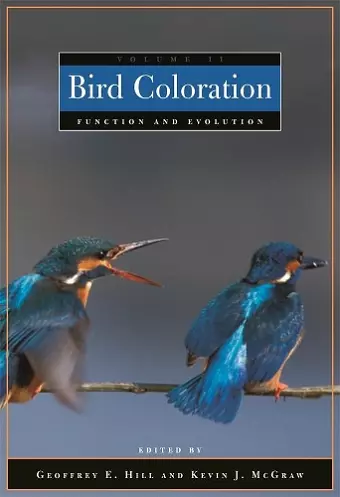Bird Coloration
Geoffrey E Hill editor Kevin J McGraw editor
Format:Hardback
Publisher:Harvard University Press
Published:31st Mar '06
Currently unavailable, and unfortunately no date known when it will be back

Together, these two volumes present an outstanding collection of contributions, written by leaders in the field and offering a modern, state-of-the-art review of our understanding of bird coloration--including the mechanisms, function, and evolution underlying the variation we see today. -- Michael S. Webster Washington State University
In this sumptuously illustrated companion volume to Bird Coloration, Volume 1: Mechanisms and Measurements, the authors explain the function of the colorful displays of birds and examine the factors that shape the evolution of color signals.
In this companion volume to Bird Coloration, Volume 1: Mechanisms and Measurements, Geoffrey E. Hill and Kevin J. McGraw have assembled some of the world’s leading experts in the function and evolution of bird coloration to contribute to a long-overdue synthesis of a burgeoning field of inquiry. In Volume 2, the authors turn from the problem of how birds see and produce color, and how researchers measure it, to the function of the colorful displays of birds and the factors that shape the evolution of color signals.
The contributors to this volume begin by examining the function of coloration in a variety of contexts from mate choice, to social signaling, to individual recognition, synthesizing a vast amount of recent findings by researchers around the world. The volume and the series conclude with chapters that consider coloration from an explicitly evolutionary perspective, examining selective pressures that have led to the evolution of colors and patterns on body and plumage. These functional and evolutionary studies build from research on mechanisms of production and controls of expression, covered in the previous volume, bringing the study of color full circle.
This sumptuously illustrated book will be essential reading for biologists studying animal coloration, but it will also be treasured by anyone curious about why birds are colorful and how they got that way.
The aim of Bird Coloration is to provide a flavour of the extent to which birds have exploited the sun’s rays… These two volumes also delve deeper into the disparate ways in which bird colours are produced, what purpose they perform, their effect on communities in general, and finally, how they got here in the first place—their evolution… The reference lists alone are priceless… Bird Coloration will appeal to students of, and researchers in, evolution in general, because the devices that cause colour are often considered as phenotypes. Those interested in ecology, animal behaviour and vision studies will benefit, too… And if further incentive is needed to buy these books, just flick through the colour sections. -- Andrew R. Parker * Times Literary Supplement *
“The two volumes of Bird Coloration provide an excellent up-to-date overview of the topic… Bird coloration is a huge topic and anyone organizing an overview should be heartily congratulated. -- Andrew T. D. Bennett * Nature *
This anthology of scientific writing in two volumes explains much of what is known about bird coloration and highlights that which we do not know. Subjects like whether the bright coloration of a male Northern Cardinal increases or decreases its chances of being captured by a visual predator like the Cooper’s Hawk are debated… Many of the contributions to this text are scientifically detailed, however, the fascinating subject of bird coloration is presented at a level that the average reader would learn much about this fascinating subject. -- Robert Hoopes * Wildlife Activist *
Together, these two volumes present an outstanding collection of contributions, written by leaders in the field and offering a modern, state-of-the-art review of our understanding of bird coloration—including the mechanisms, function, and evolution underlying the variation we see today. -- Michael S. Webster, Washington State University
ISBN: 9780674021761
Dimensions: 235mm x 162mm x 38mm
Weight: 953g
528 pages